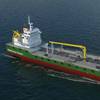The competitive satellite communications market has taken an additional step toward consolidation, with Station 12 — an independent operating business owned 65 percent by KPN (Royal Dutch Telecom) and 35 percent by Telstra — leading the way having the intention of cornering the market. Station 12 recently outlined its strategy to double its size in the next three years, both through organic growth and acquisitions.
Station 12 already claims to have 24 percent of the competitive Inmarsat maritime and mobile satellite communications sector, with current annual sales of $215 million. This is expected to rise to $500 million by 2003. The company is the largest customer and shareholder in Inmarsat, the leading provider of wholesale satellite airtime. To supplement existing services, Station 12 is considering several possible acquisitions including companies with applications expertise, content, software and other value-added services. However, the company's initial focus will be integrating the two satellite operations and developing the best services available.
Targeted growth in annual sales is around 30 percent with an operating margin of at least 10 percent.
Newly appointed chief executive, Knut Reed believes that the nature of satcom services is changing, moving from voice 'pipe' to broadband/multi-media end-solutions. Many market changes like deregulation, consolidation and customer focus will reshape the satcom industry.
He notes that users are increasingly looking at satcom to give them total global access. The market will shift from voice to data: by 2004, some 70 percent of all Inmarsat traffic will be data. Indeed, Internet access will become central to many users and, he predicts, up to 10 percent of this access will be served via satellite.
"The key differentiator for Station 12 is our long-term understanding of our customers," said Reed. "We've been working with the maritime industry and remote land area customers for more than 15 years. Our objective is to continue to provide high quality products and services and develop new and advanced services to enable our customers to grow their businesses. We also want to build our content, applications and transactions services; a good illustration is our unique satcom positioning and e-mail application used by fishing fleets." Station 12 offers global connections, combining technical resources with strong sales channels. Much of the company's business is in the maritime sector where it plans to expand services through integrating content and applications with the intention of strengthening its position as the preferred end-to-end solution provider.
In order to achieve its growth objective, the company plans to aggressively expand its services into the fixed satellite business. This is a sector where there is considerable growth potential for services such as VSAT, IP backbone, high speed Internet and multimedia.
Reed said that to achieve these targets, the company is strengthening the management team. He has joined the company from a position in international management with Norwegian telecom leader, Telenor, and already he has reshaped the organization of Station 12, creating two major operating business units. Station 12 sales and marketing director, Michiel Struijk has been appointed to head the Mobile Satcom Division. The company is searching for a top industry professional to head the Fixed Satcom Division.
Michael P. Smith, previously general manager for Telstra Global Satellite, has joined the company to head a new function in corporate strategy and communications. Paul Peppelman becomes responsible for network operations, including the Netherlands and Perth land earth stations, the company's link into the satellite network.
The company will operate from its head office in The Hague, with a strong presence in Australia and selected markets. The CFO for the new company is Ron Kevenaar, previously financial officer within KPN Satcom.
Stratos Acquires Seven Seas
Stratos Global Corporation has entered into a definitive agreement to acquire the assets of Seven Seas Communications, Inc. for $15.5 million. The transaction is subject to completion of due diligence and other closing conditions. Seven Seas is the largest non-facilities based provider of global and regional satellite communication solutions to customers in the Americas.
The company offers a full suite of products including Inmarsat, MSAT and Globalstar, as well as value-added services and customer care support. With several strategically located sales offices, approximately 20 direct sales individuals and an independent network of more than 100 dealers, Seven Seas has built a leading position in key land and maritime vertical market segments including natural resources, commercial fishing and yachting. Seven Seas has exhibited consistent revenue and EBITDA growth rates of more than 30 percent since 1995, with 50 percent growth in 1999.
"We have had a close relationship with Seven Seas for over eight years and are very excited about the capabilities that Stratos will inherent through this acquisition," said Derek Woods, president and CEO of Stratos. "Not only do we strengthen our distribution capabilities in North America and Latin America, but the strong revenue and cost synergies make the transaction immediately accretive to operating income."
MTN Adds Flex To Communications
In maritime satellite communications, continuous, uninterrupted service is paramount. In development at this time is a revolutionary stabilized antenna system that will simultaneously transmit on C and Ku band and in both linear and circular polarity. The big advantage for MTN customers with the new system is flexibility. Designated the 106M4S3, the system under development is a 2.7-m. stabilized satellite maritime system. The breakthrough technology deployed combines the ability to operate on two diverse frequencies that represent (but are not limited to) C and Ku satellite bands, and to transmit and receive signals that are modulated in both linear and circular polarity from the same compact antenna system. Antenna control, configuration, and mode selection are all quickly and efficiently handled from below deck. Dual system configurations are available for diverse antenna placement to eliminate satellite blockage.
Globalstar Offers Internet Via Sat Phone
Globalstar recently carried out test transmissions of Internet data through the Globalstar satellite network via Qualcomm's Globalstar tri-mode telephone. The service will be offered as a commercial product later this year.
This Internet demonstration, conducted by Globalstar and its technology partner, Qualcomm, is touted as proving that the Globalstar system — which already provides voice communications from virtually any point on earth — will also be able to support data and Internet connectivity as part of its overall range of services.
The Globalstar system provides affordable satellite-based digital voice services to a broad range of subscribers. Globalstar meets the needs of cellular users as well as mobile subscribers outside cellular coverage, and residents without existing telephone service.
New Ops Center for Globe Wireless
Globe Wireless has expanded operations with the addition of a new network operations center in Liverpool, U.K. The new center provides a mirrored site for the company's main operations center in Half Moon Bay, Calif.
Sponsored Content
Anschuetz USA: Supporting the U.S. Maritime Industry

Maritime leaders unite to tackle ocean plastic with launch of new alliance: the Maritime Association for Clean Seas

Subscribe for
Maritime Reporter E-News
Maritime Reporter E-News is the maritime industry's largest circulation and most authoritative ENews Service, delivered to your Email five times per week










